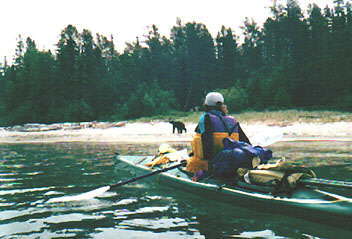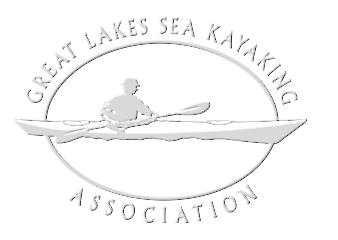Dorothy McLaughlin

PART I: LET THE HIKERS FEED THE BEARS
The spring of ’97 was a very late spring and a very poor spring for bear food. A young black bear and two older bears were forced to wander the Pukaskwa hiking trails searching for people food. The young bear came near a beach where our group of seven women was enjoying the beauty of land, lake, sky and lunch. As it moved through the forest it made little sounds heard only by a woman who quickly left the bush and reported suspicious noises. There are many kinds of forest sound, but we soon departed. After a few more hours of gentle waves and warming sun, we found a spacious campsite connected with the hiking trail and “developed” with prepared tent sites, a privy, and a large metal box plus chain and clasp.
Late that evening, the young bear arrived, found that no food had been left in its box, and so approached the tent sites. The group of women suddenly became very rowdy, rushing about with blowing of whistles, hostile shouts, and waving of paddles. The young bear retreated while we locked up our food packs and then serenaded us with prolonged rhythmic shaking of metal doors. Back at the tents, we built a fire and arranged shifts for a night watch. The young bear slumbered through the night and returned in time to see the people food departing for the next site. This site also had level tent spaces and two privies – one for people, one for wood for a porcupine, and a bear pole.
The young bear ambled along the hiking trail and arrived the next morning, too early for breakfast, and was greeted by loud shouts. For our protection, we had left the tents open; the bear found the first tent rather cramped so it turned to the bear pole to demonstrate great skill and speed in tree climbing. Chew. Crash. Chomp. Gone was the Triple Sec. The bear withdrew a short distance to give undisturbed attention to a large bag of gorp while our intrepid leader tossed back the pack and other items, to one cautionary growl. (The woman who regained her heart medicine was especially pleased.) Another hasty departure was followed by a visit to an outstanding rock gallery and a late breakfast.
The next campsites were chosen for their undeveloped nature and separation from the hiking trail. Cooking by stove avoided giving smoke signals. Beach tenting, however, became damp when Lake Superior’s winds tilted the waters towards the west shore. Tent sites were fewer and uneven, but there were no bears.
On the return towards Hattie Cove, we returned to a developed site, which previously had been bear-free. Alas, the bear telegraph was working. A more experienced and more determined older bear explored a concealed tent while we dined. It tasted an empty T-shirt, emptied a tasty air mattress, and left a trail of clothing leading into the forest. The bathing suit modestly taken deep into the woods was too small to try on. The bear returned to the tent but tripped over a rope, and the “crack” of the pole alerted the defense. Hide-and-seek began. Retreat. Approach from another direction. Part of the crew hustled the food to the bear box while the others kept track of the visitor. Then it was back to thumping noises alternating with a major digging operation, but the box withstood. We surrounded the tents with a trip line with pot and pan alarms. As dark approached, the frustrated bear snatched a spray skirt from a nearby kayak, dragged it along the beach, looked back for the reaction, and hid it in the trees. On its return, a frustrated person made great noise, became very tall with a waving kayak paddle and began barking. The bear turned and ran. In the darkness of the night a banging of pots was followed by a sheepish “Sorry, it’s just me.” The morning’s hasty departure was somewhat delayed by a bear again working on the food box. A second distant site, totally unoccupied, drew the bear to a quick inspection while we made our hasty departure. It kindly returned to see us off.
The other older bear misunderstood the telegraph, and after a brief pause, continued walking the rocky shore in the opposite direction. Ha!
There had been no reports of bothersome bears before the start of our trip in the last week of June. A large bear had supervised the Park wardens during site maintenance, but had caused no trouble. On our return, we were told of two hikers who had had to stand and watch their packs being torn apart, while recent published reports by hikers had not included bear visits. The trip had been run by a commercial tripper who had had no problems in the past, and it appeared that the major difference was the late winter making it very difficult for bears to find food. These black bears typically were not threatening toward people and would back off from a noisy group, but their persistence was very tiring. It is worth noting that they did not appear at any of the little-used, undeveloped sites.
PART II: THE SEARCH
Lake Superior is noted for giving paddlers time for contemplation and exploration while waiting for calmer waters. On the first day we explored Hattie Cove while the waves crashed. On the last day, carefully away from the hiking trails but a short distance from the Park office, we were again stopped and became overdue. The weather radio included reports specifically for Pukaskwa but the waves did not subside in the evening as predicted. We moved out to an island for a close view, sitting on the open rock face of a small cove, colourful with lifejackets and rain gear. Back at Hattie Cove the wardens had followed up a report of a canoe dumping and found the couple safely ashore but suffering from the cold water. A solo canoeist running with the waves bobbed past. Overlooking our two somewhat heavily laden canoes, he expressed concern about the safety of the sea kayaks. Next an unmarked blue and white working-type boat passed us and continued around the island and back. I waved to no response and thought it rather anti-social. Someone with binoculars said the two men looked only straight ahead. Since they passed by two campsites I wondered if they were looking for someone. Later a helicopter passed overhead along the shore, and returned.
Early the next morning we were on our way on calm waters. Overhead was a plane in camouflage, circling, and circling, and circling, until one of the Americans in our group wondered if we were at war. I said it would have to be with them, and hoped it was just someone enjoying a training exercise at our expense. On about the tenth circle, three brightly-coloured paper streamers were accompanied by a splash from a box asking us to wave our paddles if we were who we were. We did.
Back at the Park we heard that there were two very red-faced wardens. At the kayak rental, I was told of a trip by the operator on which he radioed in that they would be a day late, were fine, and did not want rescuing, but were “rescued” anyway.
At Lake Superior Provincial Park, paddlers are requested to report back by phone when they finish their trip, but are not sought. It is worth checking on the policy before departing.
PART III: THE CBC
Unofficial rumours and an official “no comment” became a radio report that eight American women with a male guide were being sought while hiking.
Well, if the hiking bear was male, and the bathing suit bear was female, that would make eight females and one male, but it would then make five Americans and ignore us four Canadians. The report we heard as we drove home mentioned that we had been found but the cause of the problem was not known. Happily, the description of the group would not have alarmed any friends or relatives.
PART IV: THE FUTURE
Pukaskwa and the Lake Superior shore is a very special place, and I am delighted to have an opportunity to return this summer. The external entertainment is unnecessary. I hope it is a very early spring.
